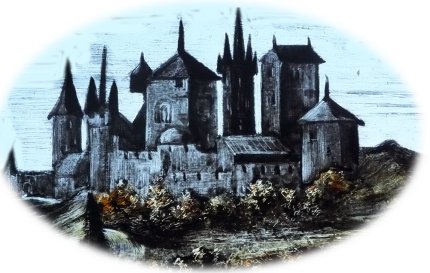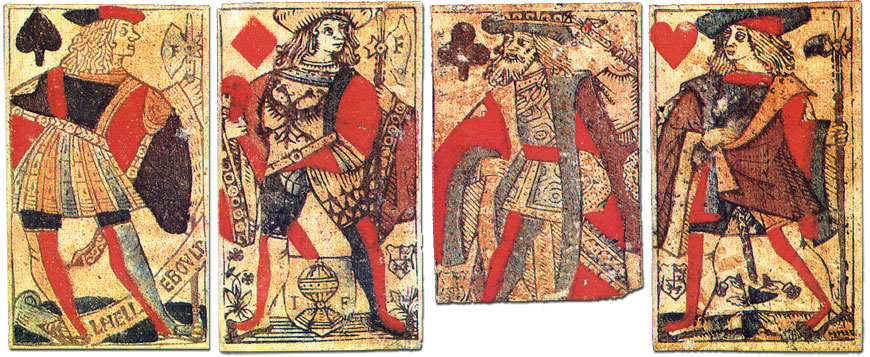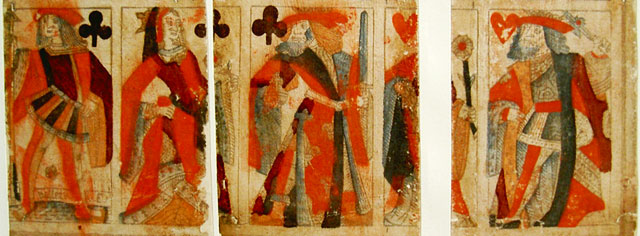Early Anglo-French Cards
Cards produced in Rouen during the sixteenth century. It was cards like these which were imported to England and are the ancestors of the modern 'Anglo-American' pattern.

What we now know as ‘French’ suit signs - spades, diamonds, clubs and hearts - is the result of rationalisation of the manufacturing technique during the fifteenth century. Many early or archaic suit systems involved intricate motifs which were more time-consuming to reproduce in woodcuts, hence the French producers invented new ones which could be reproduced with the stroke of a brush over a stencil. The four shapes are easy to recognise - 2 red and 2 black. Some card makers were experimenting with a crescent moon as an alternative symbol, but this didn't catch on. This ‘French’ suit system is now found throughout the world.
Cards shown below were produced in Rouen during the sixteenth century. The cards made in Rouen at that time were an eclectic mixture of features from cards made for various foreign markets, hence the origins of what became the "English" pattern are not one precise source, but a mixture of several earlier regional patterns. It was cards like these which were imported to England and are the ancestors of the modern ‘Anglo-American’ pattern learn more →



In the hands of English manufacturers the cards gradually became wider, losing their original slimness and liveliness, and the figures became chunky and geometrical. They remained full-length until the nineteenth century when double-ended courts were introduced as another innovation by Victorian manufacturers.
See also: Blanchard • Hunt • Early English Cards • Rick Davidson's Origins Playing Cards►.

By Simon Wintle
Member since February 01, 1996
I am the founder of The World of Playing Cards (est. 1996), a website dedicated to the history, artistry and cultural significance of playing cards and tarot. Over the years I have researched various areas of the subject, acquired and traded collections and contributed as a committee member of the IPCS and graphics editor of The Playing-Card journal. Having lived in Chile, England, Wales, and now Spain, these experiences have shaped my work and passion for playing cards. Amongst my achievements is producing a limited-edition replica of a 17th-century English pack using woodblocks and stencils—a labour of love. Today, the World of Playing Cards is a global collaborative project, with my son Adam serving as the technical driving force behind its development. His innovative efforts have helped shape the site into the thriving hub it is today. You are warmly invited to become a contributor and share your enthusiasm.
Related Articles

Ministère des Postes et Télécommunications
Famous figures connected with the French postal service, with designs by Henri Simoni.

Jeu Buffon
Illustrations of different birds from works by Buffon to celebrate the bicentenary of his death.

OXO Faces of the Millennium Dinner
Twentieth-century personalities promoting a millennium dinner at the Oxo Tower in London.

Pathé Marconi
Special promotion pack for French record company Pathé Marconi.

Kids Fun Box playing cards
Colourful cards for children with four non-standard suits connected with the natural world.

Pierre Varangot
Tracing the origins, legality and legacy of Pierre Varangot’s San Sebastián deck.

Tangle Foot Ale
Badger Brewery Tangle Foot strong ale advertising pack.

Archaic Spanish-suited pattern from Bayonne
Archaic Franco-Spanish pattern from Bayonne by a manufacturer with the initals M.V.

Luditz Pattern by Georg Geiselreiter
The discovery of 2024 changes the current state of knowledge of the history of this pattern.

Scientific Whist
“Scientific Whist” : standard cards with instructions for play on the faces by Chas Goodall & Son, 1...

Agent Provocateur
Branded lingerie collection in a pack of pin-up playing cards.

Nimbus playing cards
Mike Steer’s weather-themed pack with suits in four colours and backs for cardistry.

Caisse Mutuelle d'Assurance et de Prevoyance
Insurance propaganda pack for Caisse Mutuelle d'Assurance et de Prevoyance with humorous artwork by ...

Agatha Christie and Playing Cards revisited
Agatha Christie uses card-play as a primary focus of a story, and as a way of creating plots and mot...

The Decadent Deck
Studies in the eroticism of the female body by Inge Clayton.

Historic Shakespeare
“Historic Shakespeare” playing cards featuring Shakespearean characters by Chas Goodall & Son.
Most Popular
Our top articles from the past 28 days

